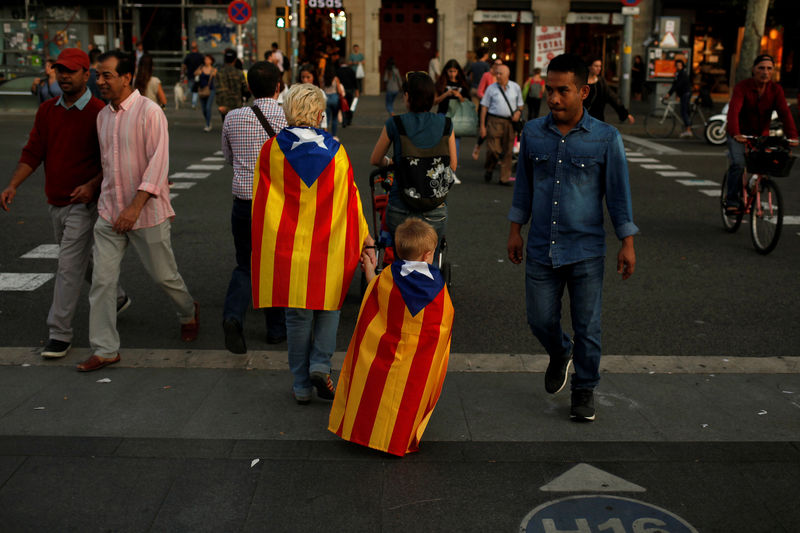(Bloomberg) -- Passengers dashed through the rain with their suitcases and police scuffled with demonstrators at Barcelona airport as Catalan separatists protested the jailing of many of their leaders.
Despite the transport disruption in the regional capital though, there was no sign as night fell Monday of the spark that might once again turn the conflict in Spain’s industrial engine room into national crisis.
Spanish politics has been dominated by Catalan separatists’ demand for independence since the illegal referendum of 2017. But Monday’s Supreme Court verdict -- nine separatist leaders were sentenced to up to 13 years for their part in the drama -- may prove a watershed.
Acting Prime Minister Pedro Sanchez has to hope that efforts to reignite the chaos of two years ago will fail, allowing him to turn the page on a period of bitterness before next month’s general election. His opponents -- whether that’s the separatists in Catalonia or the Spanish nationalists aiming to prevent him taking power again -- are betting that something will happen to rile up their support all over again.
“It’s a situation that provides some good ammunition for parties more on the political extremes,” said Alex Quiroga, a lecturer on Spanish political history at Newcastle University in England. “For Sanchez, it’s not so easy because he’s in a more defensive position.”
Splintered Parliament
The political fragmentation left behind by the financial crisis and the Catalan independence push has meant Sanchez has been unable to muster a majority despite winning April’s election, forcing him to try again Nov. 10.
The unpredictable nature of events in Catalonia also makes it hard for his government to calibrate its response, and Sanchez won’t be ready to declare an all-clear for days or perhaps even weeks.
Read More: How Catalonia Remains a Thorn in Spanish Politics - QuickTake
In his first public reaction, the premier pledged to ensure the sentence was enforced and urged the country to move on.
“A new era is opening up,” he said. “Over the next few days, the government of Spain will remain vigilant in its commitment to safeguarding co-existence, security, and respect for democratic legality.”
Catalan Protests
On Monday, access to Barcelona’s main train station was restricted by a strong police deployment as protesters gathered at the entrance. Traffic on the Passeig de Gracia, one of the city’s main roads, was blocked by another demonstration. City trains were regularly delayed during the day as activists blocked the tracks.
At the city’s airport, riot police swinging truncheons repeatedly charged protesters as crowds built up to protests the sentences. Airport operator Aena SA said on Twitter that 67 out of 1,066 scheduled flights from the airport were canceled as a result of the protests.
Opinion polls before the verdict showed backing for the Socialists is broadly stable while the conservative People’s Party and the Spanish nationalists of Vox have added support. As polls stand, the most likely outcome from new elections is still a parliament in deadlock.
PP leader Pablo Casado reacted to the verdicts by pledging tougher laws and tougher sentences in the future while calling on Sanchez to rule out pardons for those convicted.
But Sanchez has also toughened his message in recent weeks, defending his decision to avoid a coalition with the anti-austerity Podemos party, which is softer on separatism.
“Sanchez has re-positioned himself with a tougher stance to put a lid on critics from the right-wing parties and force them to accept his institutional role,” Pablo Simon, a Madrid-based professor of Political Science at Carlos III University, said by phone.
